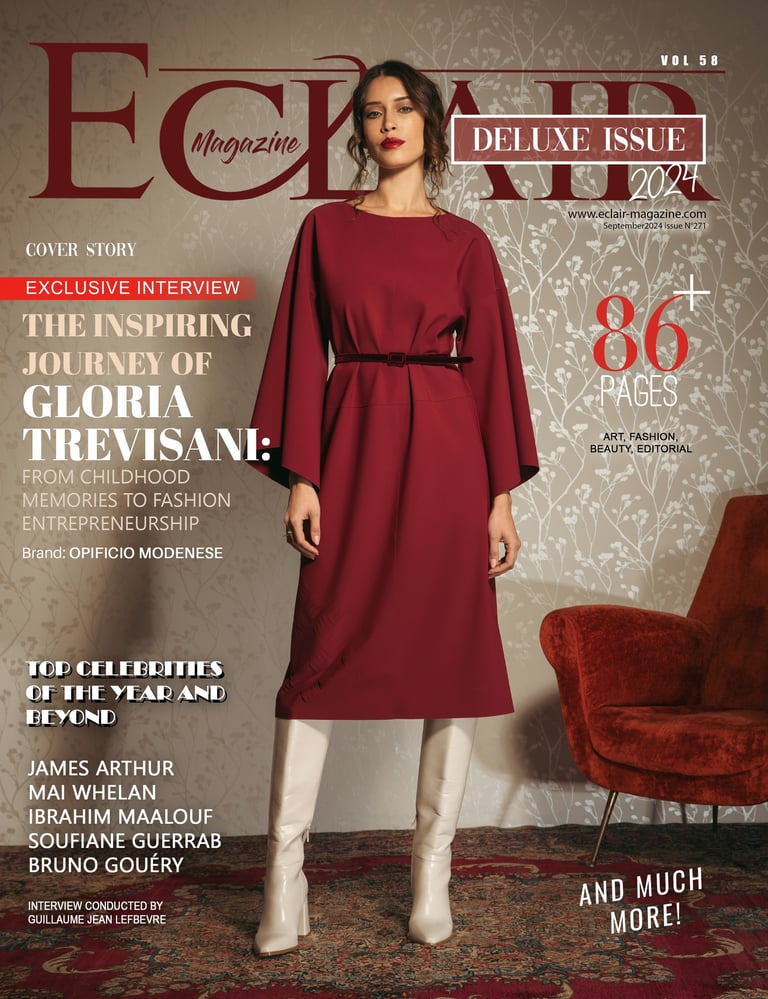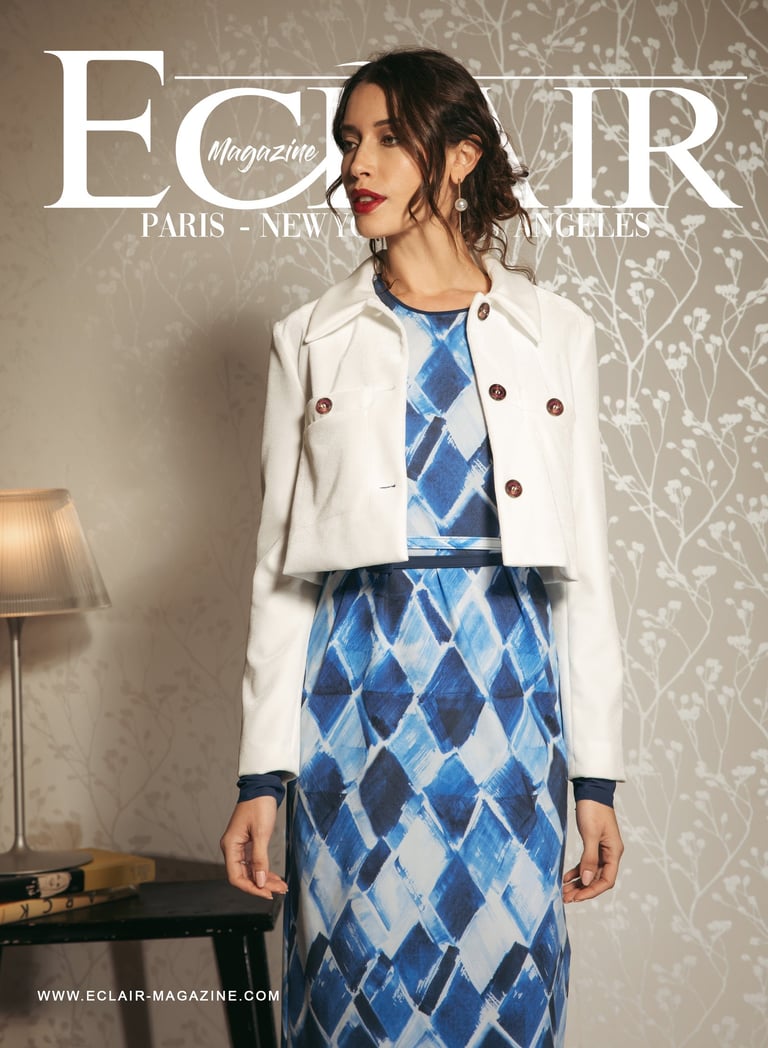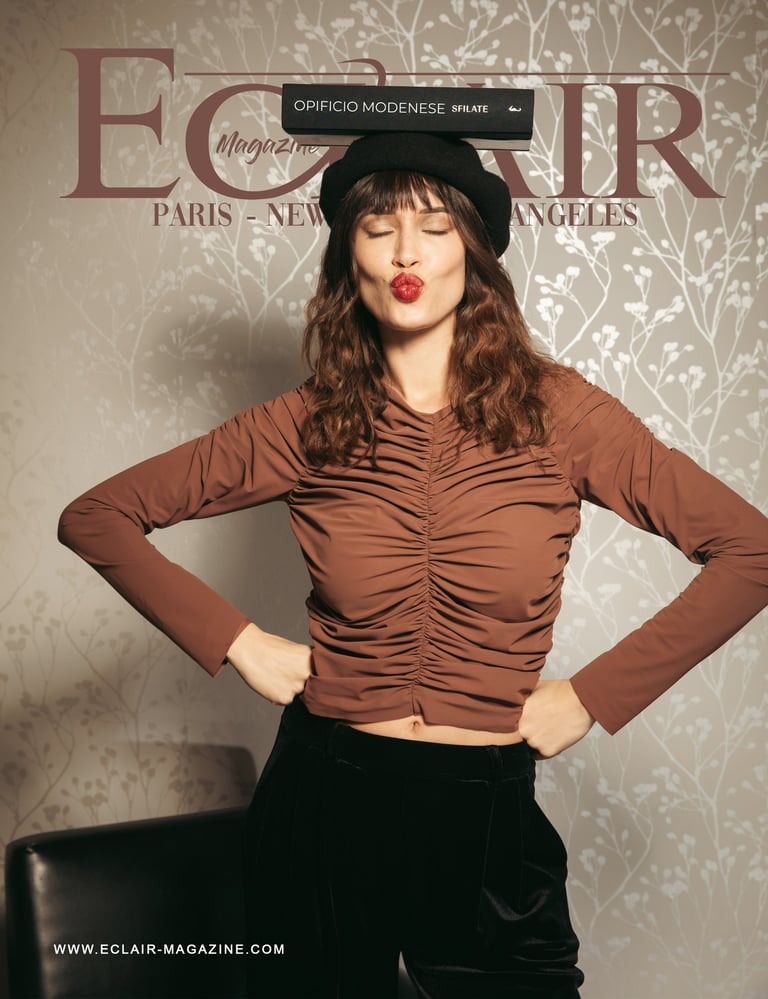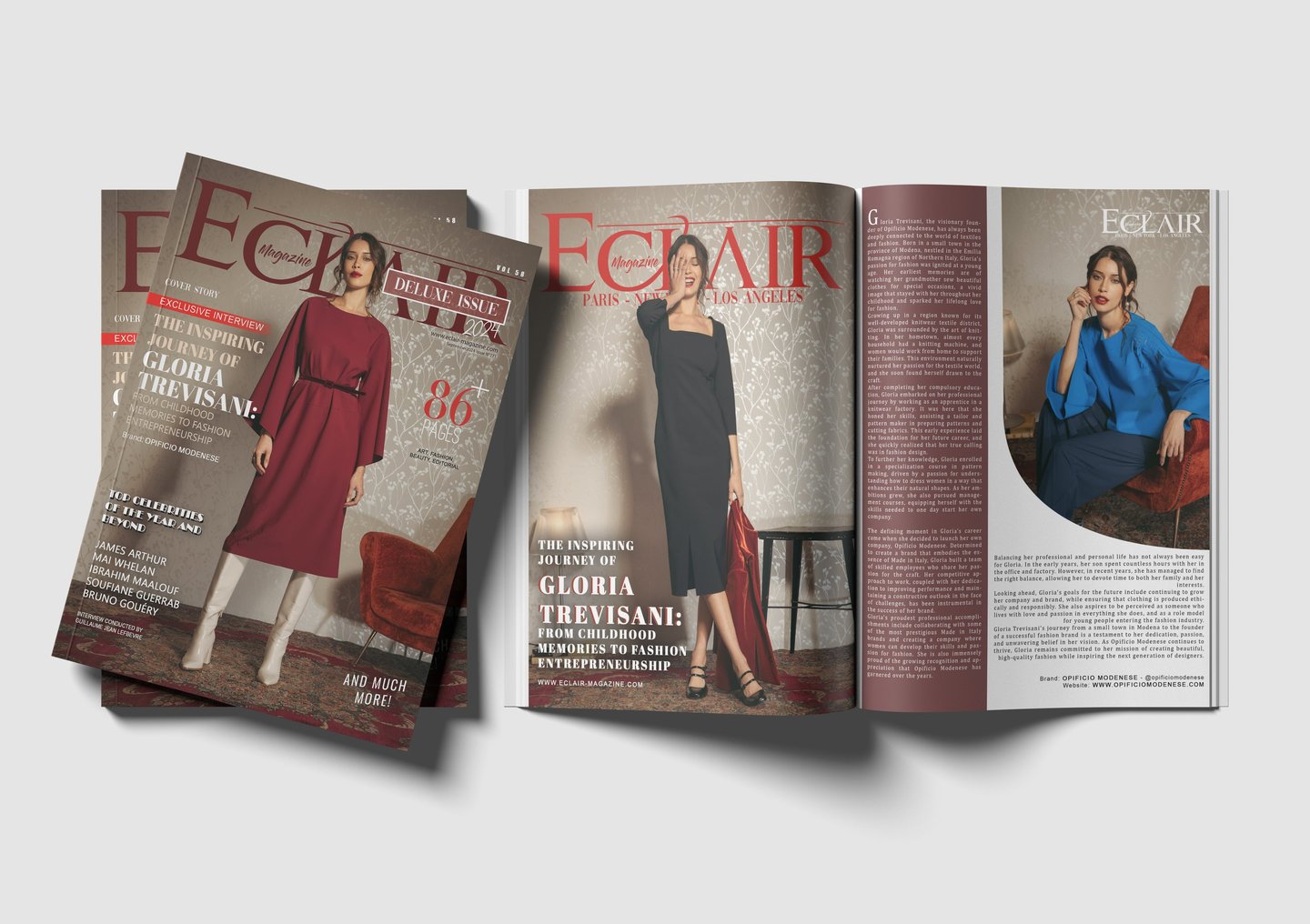SUCCESS STORY
The Inspiring Journey of Gloria Trevisani:
From Childhood Memories to Fashion Entrepreneurship
By Guillaume Jean Lefebvre


Gloria Trevisani, the visionary founder of Opificio Modenese, has always been deeply connected to the world of textiles and fashion. Born in a small town in the province of Modena, nestled in the Emilia Romagna region of Northern Italy, Gloria's passion for fashion was ignited at a young age. Her earliest memories are of watching her grandmother sew beautiful clothes for special occasions, a vivid image that stayed with her throughout her childhood and sparked her lifelong love for fashion.
Growing up in a region known for its well-developed knitwear textile district, Gloria was surrounded by the art of knitting. In her hometown, almost every household had a knitting machine, and women would work from home to support their families. This environment naturally nurtured her passion for the textile world, and she soon found herself drawn to the craft.
After completing her compulsory education, Gloria embarked on her professional journey by working as an apprentice in a knitwear factory. It was here that she honed her skills, assisting a tailor and pattern maker in preparing patterns and cutting fabrics. This early experience laid the foundation for her future career, and she quickly realized that her true calling was in fashion design.
To further her knowledge, Gloria enrolled in a specialization course in pattern making, driven by a passion for understanding how to dress women in a way that enhances their natural shapes. As her ambitions grew, she also pursued management courses, equipping herself with the skills needed to one day start her own company.
The defining moment in Gloria's career came when she decided to launch her own company, Opificio Modenese. Determined to create a brand that embodies the essence of Made in Italy, Gloria built a team of skilled employees who share her passion for the craft. Her competitive approach to work, coupled with her dedication to improving performance and maintaining a constructive outlook in the face of challenges, has been instrumental in the success of her brand.
Gloria's proudest professional accomplishments include collaborating with some of the most prestigious Made in Italy brands and creating a company where women can develop their skills and passion for fashion. She is also immensely proud of the growing recognition and appreciation that Opificio Modenese has garnered over the years.
Balancing her professional and personal life has not always been easy for Gloria. In the early years, her son spent countless hours with her in the office and factory. However, in recent years, she has managed to find the right balance, allowing her to devote time to both her family and her interests.
Looking ahead, Gloria's goals for the future include continuing to grow her company and brand, while ensuring that clothing is produced ethically and responsibly. She also aspires to be perceived as someone who lives with love and passion in everything she does, and as a role model for young people entering the fashion industry.
Gloria Trevisani's journey from a small town in Modena to the founder of a successful fashion brand is a testament to her dedication, passion, and unwavering belief in her vision. As Opificio Modenese continues to thrive, Gloria remains committed to her mission of creating beautiful, high-quality fashion while inspiring the next generation of designers.
BIOGRAPHY
1- Your passion for fashion seems to have been deeply influenced by your childhood. Can you tell us more about how your grandmother's impact shaped your design vision and how those early experiences continue to influence your creative approach today?
Watching my grandmother sew clothes for us grandchildren was crucial for me. She drew inspiration from the few fashion magazines of the time, observed other women, or looked at TV images, and then she would start cutting and sewing "by eye," without patterns, using just a measuring tape and scissors. This skill was born out of necessity and the sensitivity of being a woman. I watched her with admiration, and the next day I had my dress. These images began to plant the seed of creativity in me, and even today, those early experiences profoundly influence my approach to design.
· 2- You grew up in a region known for its knitwear industry. How did this proximity to the textile world influence your decision to pursue a career in fashion, and how does this regional heritage reflect in your creations at Opificio Modenese?
When I had to choose my professional path, I initially opted for a different sector, but for various reasons, it wasn’t possible. So, I started working in a local knitting factory. In our district, professional options were limited to the textile sector, so it was almost an obligatory choice. However, from that moment, I began to develop a passion and a desire to discover everything about the world of textiles and fashion. Over time, I accumulated skills in various departments and began to desire to have my own company where I could experiment with everything I had learned.
3- As a female entrepreneur, what specific challenges did you face when launching your first company, and how did you overcome those obstacles to make Opificio Modenese a recognized brand?
Launching my first company was a challenge to my desire to learn and continually improve. I was motivated by the desire to find clients to whom I could offer all the services I had trained for, and I wanted my company to become the "operational arm" for designers and stylists creating their collections. Each time we acquired new clients, I hired and trained new collaborators to ensure maximum support. Working side by side with so many different creatives broadened my perspective and helped me develop the Opificio Modenese project.
· 4- You mentioned taking management courses to enhance your business skills. How did these studies change your perspective on running a fashion company, and what lessons did you directly apply to the growth of your brand?
The courses I took taught me to work in an organized manner and to carefully plan every activity and step necessary for developing a brand. This training has helped me blend my creativity with a highly structured technical part, which is essential for the growth of Opificio Modenese.
Brand: Opificio Modenese - @opificiomodenese
Website: http://www.opificiomodenese.com


5- Your competitive approach to work is a key element of your success. Can you share an example of a moment when this mindset helped you overcome a major challenge in your career?
Our industry has always been very complex, and throughout my career, I have made both technical and managerial mistakes. My approach has always been to resolve the error first and then figure out why it happened to prevent it from happening again. One of the biggest challenges was in 2012 when an earthquake struck our region, destroying homes and businesses, including ours. We couldn’t access the building, and we were preparing collections and projects for imminent fashion shows. In that moment, my colleagues and I were all standing in front of the building with one wall collapsed. We were devastated and worried about our families, our work, and our towns. Yet, in that exact moment, I told myself that no matter the sacrifice, I would rebuild my company and not abandon my projects. As the days and weeks passed, during which I saw destruction and collapses everywhere, the desire to create Opificio Modenese was born. The name was chosen out of love for my region, 'Modenese,' and 'Opificio' in Latin means a place where raw materials are transformed. No name could better represent my feelings and passion for this craft.
6- Opificio Modenese seems to be a company focused on empowering women. Can you explain how you've created an environment that fosters the development of skills and passion for women in the fashion industry?
I have always believed in the abilities of women. The obstacles we face in daily life, such as balancing work with family needs, often lead to difficult choices. In my work, I have always allowed my female collaborators to choose flexible hours, part-time work, and manage their tasks so that work does not become a problem for them. Additionally, we consistently offer training courses to improve everyone’s skills. This approach allows women to develop their passion for work with a goal of continuous improvement.
· 7- You've mentioned the difficulty of balancing professional and personal life. Now that you’ve found a balance, what advice would you give to young entrepreneurs struggling to manage both aspects of their lives?
It’s not easy to give advice, but I would say that the most important and difficult part is finding inner balance. Once achieved, everything else becomes easier. A crucial aspect is having clear priorities in your life path and never losing sight of your goals. What you love doing, what makes you feel good, is right for you, and it may not necessarily be what others expect from you.






Interview
8- Ethical and responsible production is one of your priorities. What concrete measures have you implemented at Opificio Modenese to ensure that your creations adhere to these principles, and how do you see the future of ethical fashion evolving?
We have always been very focused on ethics, even before it became a "trendy" topic. We seek suppliers who share our principles regarding employee respect, and we choose local partners and suppliers to ensure a short and controlled supply chain. We support organizations that assist disadvantaged groups. We work exclusively on orders to avoid having unsold stock, and we do our best to reduce raw material waste. For the future, we need to educate and help consumers make responsible clothing choices. Our job is to create new garments every season, but we strive to avoid making collections with hundreds of pieces to prevent unnecessary waste. Consumers will need guidance in recognizing and purchasing brands that pay great attention to these issues.
9- You expressed a desire to collaborate with important Made in Italy brands. What unique qualities or characteristics do you believe Opificio Modenese brings to these collaborations, and how do these partnerships enrich your brand?
Crea Si, the parent company that develops Opificio Modenese, already works with major Made in Italy brands. We can make a significant contribution with our knowledge of materials and manufacturing techniques. Additionally, with Opificio Modenese, we have also developed commercial skills that help in creating products that meet all modern demands.
10- As a role model for the new generation of designers, what legacy do you hope to leave in the fashion industry, and what values do you want to pass on to those who follow in your footsteps?
I would like my company to be seen as a place where new skills and expertise can be experimented with. We were among the first in Italy to adopt 3D virtual modeling systems because I am convinced that high technology and craftsmanship can coexist and help new designers create beautiful collections. As for values, I am very committed to training young people in this work, which I still consider one of the sectors where creativity can truly take center stage.
Quality, not quantity
We have made quality our habit. It’s not something that we just strive for – we live by this principle every day.
